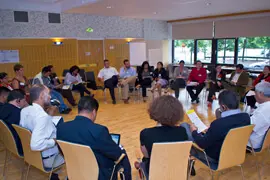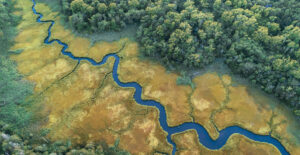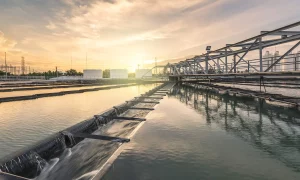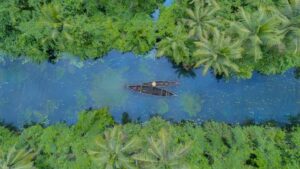Democratic and economic governance: Second knowledge management (DEG-KM) workshop
The Spanish Millennium Development Goals Achievement Fund (MDG-F) Democratic Economic Governance Knowledge Management Plan (DEG-KM) organized its second and final global Knowledge Management workshop in Stockholm, Sweden, August 22-25, 2012. The DEG-KM Plan – hosted by the UNDP-SIWI Water Governance Facility (WGF) – supports 11 Joint programmes (JPs) that aim to develop capacity, improve governance, enhance equality of participation, and increase investments in the water supply and sanitation sectors in their respective countries.
The expected results of the workshop were:
- To have shared (the gist of) methods, achievements and effects of programme implementation among the Joint Programmes,
- To identify potential ways to sustain processes and results of the Joint Programmess,
- To find strategic points for the future sharing and dissemination of the generated knowledge.
The DEG-KM Plan strives to enhance knowledge and thus support the ongoing implementation of the JPs, to successfully produce desired results, and make these more sustainable. Since the JPs are in the process of closing their operations, to document and disseminate the findings and knowledge generated within the DEG JPs, for the benefit of future programming, is becoming an increasingly prominent part of the plan.
The present, second and final global KM workshop reported on progress and findings from the implementation of JPs and the DEG-KM plan, and continued the exchange of ideas and experiences between the programmes. There were delegates from nine of the 11 DEG JPs – represented by UN agencies as well as national counterparts. To enrich the wealth of experiences and to extend the network, two national programmes from the UNDP GoAL WaSH (Governance, Advocacy and Leadership for Water, Sanitation and Hygiene programme’) programme, additional SIWI and external experts also took part in the workshop.
The first part of the workshop was focused on the JP achievements to-date, including plenary presentations and group discussions centred on questions such as – what has been done, with what effects, and how has it been monitored? The results were analyzed with a view towards establishing the collective contribution by the DEG programmes towards the MDG7 water and sanitation target. (The JP achievements, contributions to the MDG7 and how those are monitored will be presented in the parallel “Second Synthesis” Report of the DEG JPs.
Looking at ways to strengthen the remaining activities of the JPs, a ‘Roadmap for Sustainability’ was drafted by each programme – utilizing the input and inspiration from the experiences of other programmes. For continued contact and sharing of knowledge between the participating programmes, common themes of concern were identified and, to the extent possible, needs for external support and input was matched with relevant experiences. To share the knowledge and lessons learned of the programmes beyond the workshop, opportunities for the MDG-F JPs and the GoAL WaSH programmes to have joint communication and dissemination activities were analyzed.
The most common expectation of the participants was to have shared and gained new knowledge – and the fulfilment of this expectation was high throughout. The sharing of methods came mainly through the thematic sessions, which had been identified in iteration with participants during the workshop preparations. Emphasis was put on the substantive issues, which should have helped to increase the depth of the discussions.




